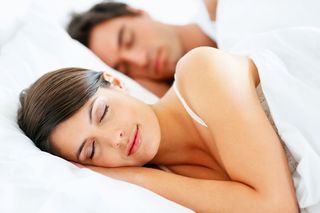Violent Sleep Disorder Gives Clues to Parkinson's

A rare sleep disorder that causes people to punch and kick others during sleep may have some of the same risk factors as Parkinson's disease, and could give researchers clues to predicting Parkinson's many years before it surfaces, a new study suggests.
The results revealed a number of factors linked with an increased risk of REM sleep behavior disorder (or RBD), including smoking, working on a farm, past head injuries and pesticide exposure.
A better understanding of how these factors might be at work in both REM sleep Behavior Disorder and Parkinson's could lead to a way of diagnosing Parkinson's and detecting it very early, said study author Dr. Ronald Postuma, a neurologist at McGill University in Montreal.
Patients with RBD typically make sounds or move during REM sleep. The condition has been linked with some forms of dementia and Parkinson's disease, with one study of 93 RBD patients showing that more than half developed a neurodegenerative disease over a 12-year period.
"People who have sleep problems who are otherwise healthy are at increased risk for developing Parkinson's and dementia," Postuma said. The findings are published online today (June 27) in the journal Neurology.
Violent sleep
Researchers surveyed 347 people in 10 countries with RBD about their lifestyles and other medical conditions, and compared the results to those of healthy people.
Sign up for the Live Science daily newsletter now
Get the world’s most fascinating discoveries delivered straight to your inbox.
In order to tease out exactly what risk factors might connect Parkinson's to RBD, the researchers matched up the risk factors for RBD they found with factors known to affect people's risk of developing Parkinson's.
But while the study may shed some light on what might lead to RBD, it also further clouds the mystery of what causes Parkinson's, the researchers said.
For example, previous research has shown what appears to be smoking's protective effect when it comes to Parkinson's — tobacco users have a lower risk of developing the disease. However, tobacco users in this study were 43 percent more likely to develop RBD than nonusers.
Similarly, caffeine use has been linked with a lower risk of Parkinson's, but in the new study, it did not appear to have an effect on developing RBD.
Most people don't need to be particularly concerned with developing RBD, said Dr. Karin Wirdefeldt, a medical epidemiologist with the Karolinska Institute in Stockholm, who was not involved in the new study. "However, a general recommendation is to avoid exposures such as smoking and pesticides due to their potential harmful effects related to conditions other than RBD or [Parkinson's]."
The link between neurological diseases and sleep
One concern Wirdefeldt said about the research was that patients had to rely on their memories for the surveys, and this may mean that the actual increased risk of RBD linked with certain behaviors are likely to be lower.
"As the first study on the topic, it is considered exploratory," she said.
Wirdefeldt added that "10 years after RBD diagnosis, most patients have still not developed a neurodegenerative disease."
But Postuma said that it's for that reason that Parkinson's researchers should take a deeper look at sleep disorders.
"Sleep disorders can be the first sign of Parkinson's,10, 20 years before you get it," Postuma said.
Early diagnosis, he said, would ultimately help the patients who might develop these disorders.
Pass it on: A violent sleep disorder might be an early indicator of Parkinson's.
Follow MyHealthNewsDaily on Twitter @MyHealth_MHND.We're also on Facebook & Google+.
Most Popular


